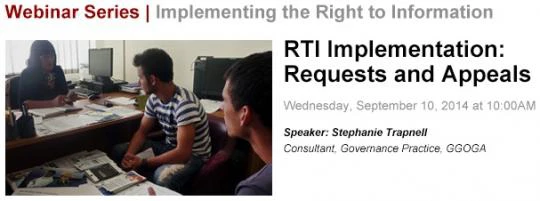More than 95 countries have laws that grant citizens right to information held by public bodies. These laws are commonly referred as the right to information (RTI) or freedom of information (FOI). The international community recognizes citizens’ ability to access public information as a human right.
RTI laws empower citizens to hold governments and public servants accountable. How? Mexican journalist Fatima Monterrosa uncovered a series of fraudulent orders from the Mexican President’s Office through information obtained from the country’s FOI law. RTI laws have been used to enforce rations distributions in India and uncover discrimination in schools in Thailand and banks in South Africa.
To find out more about how these laws are performing or what the shortcomings are of these laws, we, at the World Bank, commissioned a study to gather data on requests, complaints and appeals in eight countries.
We hoped that this study would support better understanding of the performance of RTI laws, shortcomings of the legal framework, and areas for improvement in the operation of RTI systems.
Ironically, we also discovered that Right to Information systems are, in themselves, anything but straightforwardly transparent. To talk more about the findings of our study, I invite you to join us on Wednesday, September 10 at 10am EST, for an e-webinar.
Though we will be sharing the full details of our findings on the webinar, I will highlight a couple of important findings here.
First, statistics on the type of information requested are typically aggregated at the ministry or agency level, revealing only targets of requests, not the type of information sought or whether time requirements for responding to requests were met. South Africa and Brazil were exceptions, where monitoring by freedom of information civil society organizations has produced extensive data about requests and appeals. Second, when data on requests, complaints and appeals are available, interpreting and comparing the data are not inconsequential tasks. Governments report these data at different frequencies and levels of granularity, without regard for cross-agency or cross-government comparison, and it can be difficult to compare data from the same years because the data are published by countries at different times.
We can probably all agree that timely, clear, and good quality data on the operation of Right to Information systems supports understanding of the performance of RTI laws. Data also can reveal information about high-performing agencies, which can generate positive incentives for better performance. Reporting of performance data by oversight bodies is also crucial to the principle of openness, especially in cases where the oversight body is autonomous. In spite of the importance of data on RTI requests, complaints and appeals, our study points to the relative lack of transparency of the topic and to the need to open up global dialogue on reporting standards.
I hope you will join us for our webinar and help us begin this dialogue. We will discuss much more about what we learned from our study about the operation of Right to Information systems and reflect on the purpose of RTI data collection, the kinds of data that need to be collected, standards for that data, the collection and delivery mechanisms, and the timeliness for reporting.
What are your thoughts on Right to Information Laws? Tell us in the comments.



Join the Conversation